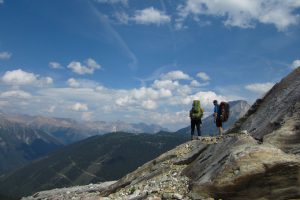Restoration Ecology Instructor
Who We Are: The Wild Rockies Field Institute (WRFI) offers academic field-based courses accredited through the University of Montana. Our courses take place in Montana, the Canadian Rockies and Utah and combine rigorous academic inquiry with cultural immersion and extended back country expeditions. Students join us from colleges and universities across North America and from a wide variety of majors. We currently offer courses in Environmental Studies, Natural Resources & Science Management, Native American Studies, Geography and Philosophy. WRFI courses broaden the nature of a liberal arts education; teach critical thinking about environmental and social issues; and foster understanding of and respect for natural and human communities
Job Title: Field Instructor for our summer Restoration Ecology in the Greater Yellowstone Ecosystem field course. This course is interdisciplinary in nature and offers students a total of three upper-division (300-level) Natural Resource, Science & Management credits from the University of Montana for their time in the field. The Field Instructor will work with one co-instructor and a teaching assistant.
Course Description: On this course, students will study restoration ecology in the context of the Greater Yellowstone Ecosystem, a vast area that is home not only to humans, but to diverse organisms including many threatened and declining species (e.g. whitebark pine, whooping cranes, sage grouse, and fluvial arctic grayling) as well as species that are showing signs of recovery (e.g. bison and wolves). Through hands-on experiences, observation, reading, discussion, and restoration work, students will examine how human uses of the land (such as logging, development, recreation, road-building, mining, and agriculture) affect ecological systems, and explore the role of restoration in repairing damage to these systems.
We will begin the course by studying ecology, natural history, and public lands policy during a backpacking trip in Yellowstone National Park. During this trip, we will discuss the fundamentals of ecology, restoration ecology, conservation biology, and natural resource policy, which will provide a foundation for our restoration work and our exploration of the scientific, social, and ethical dimensions of ecological restoration during the second half of the course.
In the second part of the course, we will work collaboratively with federal agencies on specific restoration projects, which vary from year to year depending on agency needs. Past classes have helped control exotic lake trout in Yellowstone Lake; aided restoration efforts in Red Rocks National Wildlife Refuge; assisted with wetland habitat and native plant restoration projects; constructed a fence to protect a sensitive riparian area from livestock damage; mitigated erosion problems on trails and roads; assisted with mine restoration and control of exotic plants; and helped to close and restore forest roads in grizzly bear habitat. In addition to these hands-on projects, the class will meet with a variety of guest speakers and visit with Yellowstone National Park employees to examine topics such as wolf reintroduction, bison management, and fire ecology. We will car camp during this portion of the course, and readings and discussions will focus on the role of monitoring in ecological restoration; the political, social and administrative challenges in restoration practice; and ecological restoration’s ethical and policy dimensions.
In the third section of the course, we will return to the backcountry for a six-day backpacking trip in the Snowcrest Mountain Range. During this time, we will synthesize our experiences and explore philosophical questions in restoration ecology in greater depth. Each student will develop a final project that applies knowledge and ideas from the course.
Job Qualifications: Candidates must have at least a Master’s degree in a related field, prior college-level teaching experience, a background in outdoor leadership, and Wilderness First Responder certification.
Location: The WRFI headquarters are located in Missoula, MT. The Restoration Ecology course begins and ends in Bozeman, MT with field expeditions in and around Yellowstone National Park, the Red Rock Lakes National Wildlife Refuge and in the Beaverhead-Deerlodge National Forest.
Dates: The three-week Restoration Ecology course typically runs from late June to mid-July. Candidates for this position must be available to be in the field for the entire three week duration of the course. In addition to time in the field, the instructor will be responsible for pre-course preparation and post-course wrap-up.
Compensation: Field pay ranges from $100 to $125 per day depending upon experience. Pre and post course work is compensated at $15 per hour. A food stipend and travel reimbursement will be provided.
How to Apply: Please send a cover letter, resume and three references to [email protected].
Closing Date: Open until filled
 Inconspicuous motes of rock and gas hearts of the stars Vangelis worldlets gathered by gravity bits of moving fluff brain is the seed of intelligence, Cambrian explosion, network of wormholes star stuff harvesting star light the ash of stellar alchemy corpus callosum Orion’s sword extraordinary claims require extraordinary evidence stirred by starlight, Cambrian explosion.
Inconspicuous motes of rock and gas hearts of the stars Vangelis worldlets gathered by gravity bits of moving fluff brain is the seed of intelligence, Cambrian explosion, network of wormholes star stuff harvesting star light the ash of stellar alchemy corpus callosum Orion’s sword extraordinary claims require extraordinary evidence stirred by starlight, Cambrian explosion.